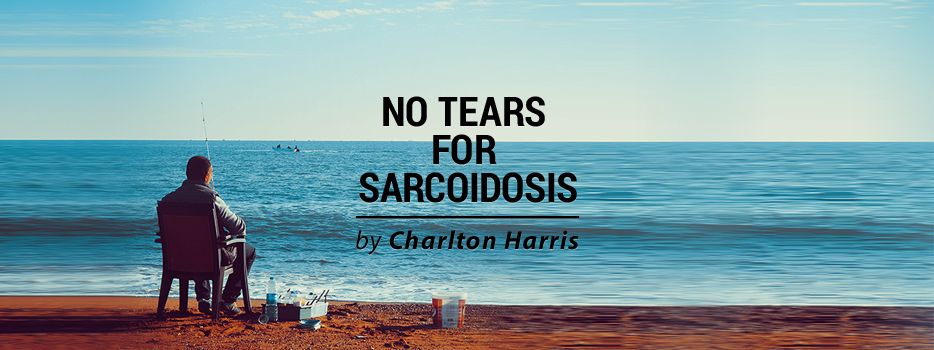We Learn About Ourselves When Learning About Others
Written by |

“I can be changed by what happens to me. But I refuse to be reduced by it.” — Maya Angelou
Last year, my primary pulmonologist and I decided to get a second opinion about my pulmonary sarcoidosis, as well as any alternative options that might be available to me. So, I reached out to the Harron Lung Center at Penn Medicine in Philadelphia.
At this time last year, I had just completed a battery of tests, including multiple X-rays, CAT scans, electrocardiograms, echocardiograms, and over 50 blood tests. The end result was that I needed to increase my vitamin D intake.
Needless to say, I was pleased that everything was good and my condition was stable. Having experienced multiple spontaneous pneumothoraces, moving forward with my life can be scary at times.
This rodeo was different
Last November, I met with doctors from Penn’s lung team. Since I was new to them, we decided that testing would be beneficial, so they could see how healthy I was. At first, it didn’t seem too bad, until a doctor mentioned that not only would I need to repeat the bloodwork, but also I would have to have a right- and left-heart catheterization.
Needless to say, I wasn’t happy about it, but I bit the bullet and agreed to all of the tests. To me, it was a necessary “evil,” because it would tell the doctors and me everything we needed to know about my health and my life with pulmonary sarcoidosis.
A few days before the new year, I met with a doctor to go over all of the results. As with all of the tests I took at the start of the year, my results were good, including the heart caths. I can’t say I was surprised, but I was relieved. I guess some things I’ve been doing have worked in my favor.
But then the doctor took me for a loop with her overall assessment.
I wasn’t expecting that
As she finished discussing my test results, the doctor mentioned something I never expected to hear. She told me that based on my test results and a video she and her team had viewed of me performing certain tasks, they felt that I was “frail.”
“Frail!”
She could’ve told me anything: I could’ve been ugly, smelled funny, or had a big head, but “frail” was something I never expected to hear.
Upon seeing my reaction, she apologized and noted that the entire team of doctors had come up with that assessment. She told me that she didn’t necessarily agree with the assessment, and that I was in great shape for my condition.
As we talked more, it became apparent what the doctors had meant by their comment. I told her that due to the pandemic and the gyms being closed, I haven’t been able to work out like I’m used to doing. I don’t have a treadmill at home, and I can only do so much with weights and a medicine ball.
The answer in the storm
With everything going on in life as we know it, the doctor decided it would be beneficial for me to enroll in their pulmonary rehab program. It’s now two weeks later, and I’m in the program!
The program is more involved than what I was previously used to. At the outset, I liked the new program because I felt it would help me get back on track.
At the end of my first meeting, we had a short discussion about the program, lung health, and how to manage my breathing. Before I left, the therapist asked what I thought about it all. I told him I liked it, because it seemed more rigorous than what I was used to.
He asked if I knew any famous people alive today that had one lung. Completely stumped, I responded that I had no clue. To my surprise, he said the answer was Pope Francis!
“The Pope?” I asked, surprised.
He saw the expression on my face and chuckled. Then, he nodded in agreement, adding, “Don’t worry, you’ll be fine. You’ll be OK!”
Obstacles don’t define us. No matter the challenge, you gotta keep showing up and you gotta keep moving. Just keep moving!
***
Note: Sarcoidosis News is strictly a news and information website about the disease. It does not provide medical advice, diagnosis, or treatment. This content is not intended to be a substitute for professional medical advice, diagnosis, or treatment. Always seek the advice of your physician or other qualified health provider with any questions you may have regarding a medical condition. Never disregard professional medical advice or delay in seeking it because of something you have read on this website. The opinions expressed in this column are not those of Sarcoidosis News or its parent company, Bionews, and are intended to spark discussion about issues pertaining to sarcoidosis.






Patricia OConnor
I was very surprised to read that a Pulmonalogist recommended Vitamin D for a person with sarcoidosis. My sister suffers from sarcoid and her doctor recommended increasing her Vitamin D which resulted in her having Hypercalcemia for which she had to be hospitalized in order for the calcium to be flushed out of her blood. I believe her creatinine levels also went up.
Now she has to drink volumes of water and have her blood tested regularly. Is a normal dose of Vitamin D 3 , 1000 I.U. not dangerous to Sarcoid patients? My sister was prescribed 2000 I.U.